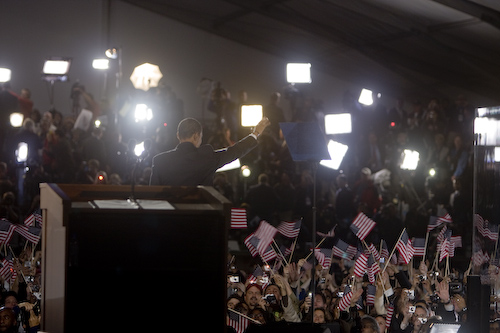There is a time-tested axiom in American politics: Show me a candidate who’s relying on the youth vote and I’ll show you a loser. Barack Obama did and as we know, he ain’t no loser.
His brilliant use of the Internet and his get-out-the-vote efforts will be studied as a textbook example not so much of a multichannel marketing campaign as an every channel campaign. The campaign will be studied within the political world for bucking history and actually getting young voters to cast their vote.
The Perfect Political Storm
When campaign operatives said they believed they’d win because they were on the right side of history, they meant it. Obama’s historic campaign depended upon a set of conditions and circumstances that are unique to this historical moment.
So what are were the headwinds that capsized the Republican ship?
Let’s start with the candidate.
Candidate Obama was a young, charismatic African American with an optimistic attitude.
As a member of Generation X, his youth was closest any candidate could come to appealing to the Millennial generation. As an Xer, he was adept at communicating online and so was fluent with Millennials’ preferred communication channels.
His African American heritage obviously appealed to blacks but more importantly, he had a real chance of winning. As a bi-racial American, he looked like Millennials, the most diverse generation in our history. That fact appealed not just to African Americans but to all Americans of color.
As a gifted orator, he inspired Millennials with his Yes-We-Can optimism and blew them away with a type of political rhetoric that appealed to their sensibilities. This über-confident generation believed they could change the world; Of Course They Can, and he was the one who would lead them. He harnessed the idealism of youth.
For African Americans, Barack Obama was a natural extension of their cultural and political heritage. From jazz and the blues to Malcolm X and Martin Luther King, Jr. to Jesse Jackson to hip hop, Obama’s oratory flowed naturally with its creativity, improvisation and musicality.
Barack Obama is also a talented writer and it is the writer’s keen understanding of the importance of storylines that informed the entire campaign. When McCain was reiterating his biography ad naseum on the campaign trail, Obama was telling the next chapter in a story about the American people. Once you learned McCain’s biography, that was it; but you needed to stick around to find the ending of Obama’s story.
More importantly, storytelling was a central element of Camp Obama, the training camps to which they sent volunteers. Volunteers were encouraged to tell their stories, to tell what compelled them to volunteer for Obama. This invested volunteers in the campaign and emphasized, as the candidate did over and again, that this election was about them, not Obama.
The encouragement of volunteers to tell their own stories trained them in the language of the Web. The tone of online language is informal, conversational, and in the first-person. When Obama’s volunteers and fans supported him online, that ability to advocate in their own words, with their own stories, made that communication all the more persuasive because it felt natural and genuine and therefore more trustworthy. When this communication is compared with the copy-and-paste blog comments McCain provided his supporters on his Web site, the contrast between the two campaigns is all the more glaring.
Obama’s ability to motivate his supporters was largely a result of his charm, charisma and his language skills. But it was his community organizing skills that were valuable in getting his volunteers to actually do stuff.
While the Republicans sneered at their “political organizer” opponent during their convention, it was those very skills that helped spank Republicans at the polls on election day. The Obama team used social networking sites like Facebook and text messaging to manage the logistics of organizing boots on the ground. The my.barackobama.com Web site provided supporters the tools to identify Obama voters and ensure they voted.
Finally, and hardly insignificantly, was the political environment that favored Democrats in general and Obama in particular. Obama opposed the unpopular Iraq war from the start, so he had the sizable percentage of the Democratic party who were angry over the war solidly behind him. And if Democrats weren’t pissed off about the war, they had Katrina to be angry about. Or wiretaps. Or torture. Democrats were energized and Republicans were demoralized.
John McCain made two major mistakes. The first was the pick of Sarah Palin as his running mate. When it became clear that she was in over her head, rather than it being bold, the pick looked irresponsible and indicative of bad judgment. The second, and fatal, mistake was saying that the fundamentals of the economy were sound in the midst of a national financial meltdown.
Ultimately, any Republican may have never had a chance but Obama ran a near flawless campaign and there’s a lot to learn about online marketing from studying it.
Tomorrow, I’ll go into more depth about the role Millennials played in his online success.
Read also:
The e-Strategy Academy covers all aspects of digital marketing including search optimization & marketing, email marketing, social media marketing, video marketing, mobile marketing & public relations.
